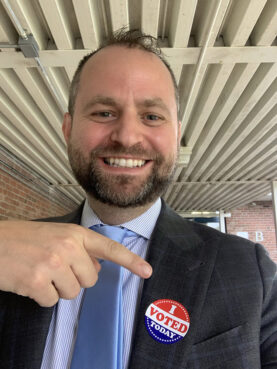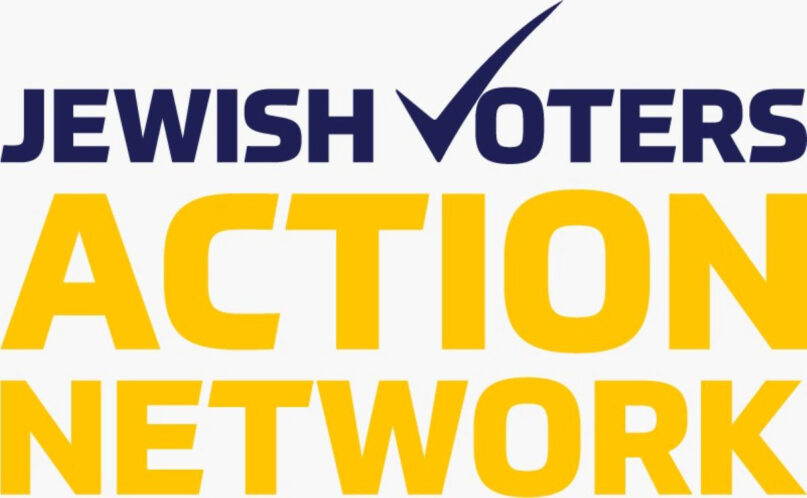(RNS) — As New Yorkers gear up for local elections in 2025, the Jewish Voters Action Network is working to increase turnout among Jewish voters in the city. In early January, the nonpartisan organization launched a $7 million campaign to mobilize Jews to the polls.
“We want to make sure that our voices are heard at the ballot box,” said the group founder, Maury Litwack.
Litwack said that the city’s elected officials have failed to address the Jewish community’s concerns about rising antisemitism. “There have been more bold antisemitic attacks than ever before, and it’s something that the Jewish community is feeling. They’re feeling it, they’re seeing it, and they’re looking to take action against it,” he said.
Besides the race for mayor, which has drawn nine candidates including incumbent Mayor Eric Adams, New Yorkers will elect five new borough presidents, a comptroller and a public advocate. All 51 City Council seats are also on the ballot this year.

Maury Litwack, founder of the Jewish Voters Action Network. (Courtesy photo)
Litwack launched the network in 2024 after years working locally to engage Jewish voters in California, Florida, New Jersey and New York. Other volunteers from those campaigns, he said, often expressed a wish for support from a national organization.
The rise of antisemitism convinced him that the need for this type of organization was more pressing.
In April 2023, when Republican Councilwoman Inna Vernikov, a Jewish Brooklyn resident, introduced a bill to establish an “End Jew Hatred Day,” the measure was being pushed by the End Jew Hatred Campaign, which has worked to create similar awareness days in five U.S. cities.
The New York measure was adopted despite two council members voting against it and four abstaining.
One no vote came from Shahana Hanif, councilwoman for Brooklyn’s Park Slope neighborhood, home to an important Jewish community. The other was Sandra Nurse, who represents the Brooklyn neighborhood of Bushwick.
Hanif, who currently works on her own bill on antisemitism, said she opposed the resolution because she considered End Jew Hatred to be a “right-wing organization.”
RELATED: Protests suggest split among US Jews on war, but support for Israel is high
But Litwack said the vote was a wake-up call. “I just think that is the kind of thing that is very disturbing to members of the Jewish community. It’s the thing I’ve heard the most about from members of the Jewish community, which is how could people vote no. That seems to be the easiest way you could say, ‘Hey, I care about antisemitism and stopping it,’” he said.
A survey commissioned by the group before launching its first campaign revealed antisemitism was most Jewish voters’ top concern. Conducted by the Honan Strategy Group, the survey of 681 Jewish voters in Pennsylvania and New York showed that after the Oct. 7 attack, Jewish voters were more attuned to local candidates’ positions in upcoming elections.

Jewish Voters Action Network logo. (Courtesy image)
On its website, the network has resources for volunteers who want to participate in phone banks and canvassing. It also encourages people to use the Up Vote mobile app to share voting registration links with family and friends. Training is also available for individuals “well connected in their Jewish institutions” to become “community captains.”
New York City voters — and the city’s Jewish voters — overwhelmingly vote for Democrats, meaning most races are decided at the Democratic Primary. The network is currently focused on getting independent and Republican voters to register for New York’s Democratic Primary before the Feb. 14 deadline.
Rachel Dabah, a JVAN volunteer, said she encountered many non-Democrat voters who either didn’t know they could vote in the Democratic Primary or didn’t think it made a difference.
Dabah, a 33-year-old resident of the Upper East Side, said she decided to get involved when she realized how important local races were in shaping the community’s everyday life. “I want to make sure that the people in my community and people in this neighborhood are actually in a position to make a difference and to be heard,” she said.
Dabah wants to convince her neighbors that, regardless of their political affiliations, they should have a say in the candidate who will run for mayor and ensure he or she stands firm on antisemitism. She suggested the network set up tables outside schools, supermarkets and other places in the community.

(Photo by cottonbro studio/Pexels/Creative Commons)
Dabah noted the group also reaches out to non-Jewish voters. “They want to make sure the area is safe. In a community, we all want the same things, pretty much. So we were speaking to everybody, not just Jewish voters,” she said.


